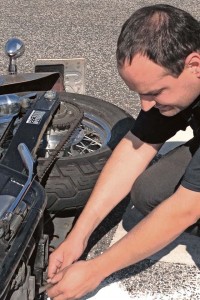
U.S. Army Garrison Kaiserslautern firefighter Mario Hoinigg, beside the motorcycle, assists local emergency responders at the scene of a recent accident in Sembach.
U.S. Army Garrison Kaiserslautern firefighters Mario Hoinigg and Hans Zoske had just left Sembach Kaserne when they came across an injured German motorcyclist in the roadway.
Zoske, who’s been a firefighter for 22 years, calmly moved into action. He turned on his vehicle’s hazard lights and ran to the injured rider.
“The guy was on the street and his bike was about three meters away,” Zoske said. “I could see that he was in pain.”
The pair had just completed a training session at Sembach Kaserne, where they were showing Soldiers of the 30th Medical Command how to properly use fire extinguishers. It was about lunch time and they were on their way back to Rhine Ordnance Barracks. The accident occurred just before the entrance to autobahn A63.
While Zoske checked on the injured man and helped him to the roadside, Hoinigg switched on his vehicle’s blue lights and stopped traffic.
“He was in serious pain,” Zoske said. “I checked him for wounds, bruises and cuts.
Meanwhile, Hoinigg saw the damaged motorcycle was leaking fuel. To sop up the puddle of gasoline Hoinigg used some “dry sweep” gravel he had stashed in his car.
Ambulances soon arrived to provide further care, Police arrived to investigate. The rider may have hit his front brakes too hard going into a curve, Zoske said.
Lt. Col. George Brown, the garrison’s emergency services director, said the efforts Zoske and Hoinigg made are typical of the firefighters who support the community – professionals who are always “the ones running toward the smoke.”
“There are people here in the KMC who are 100 percent ready, trained and supplied to support our community, both on post and off post,” Brown said. “An emergency is an emergency and we’re all one community.”


